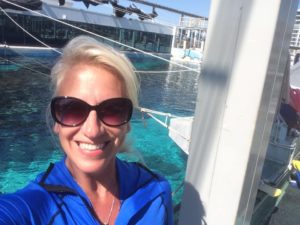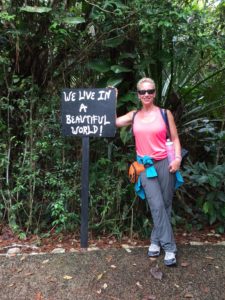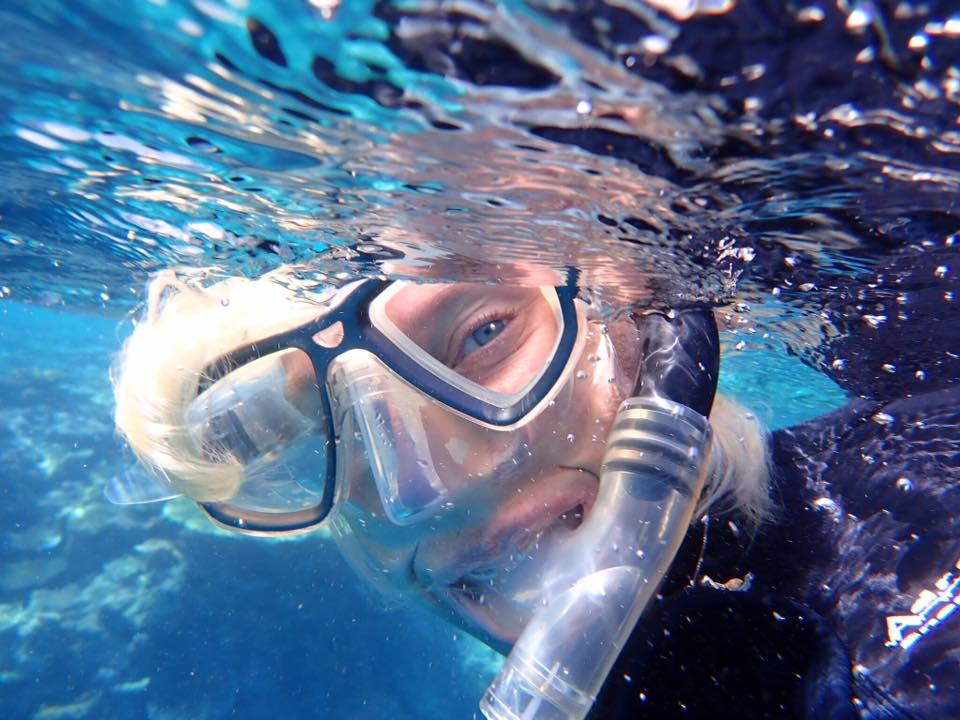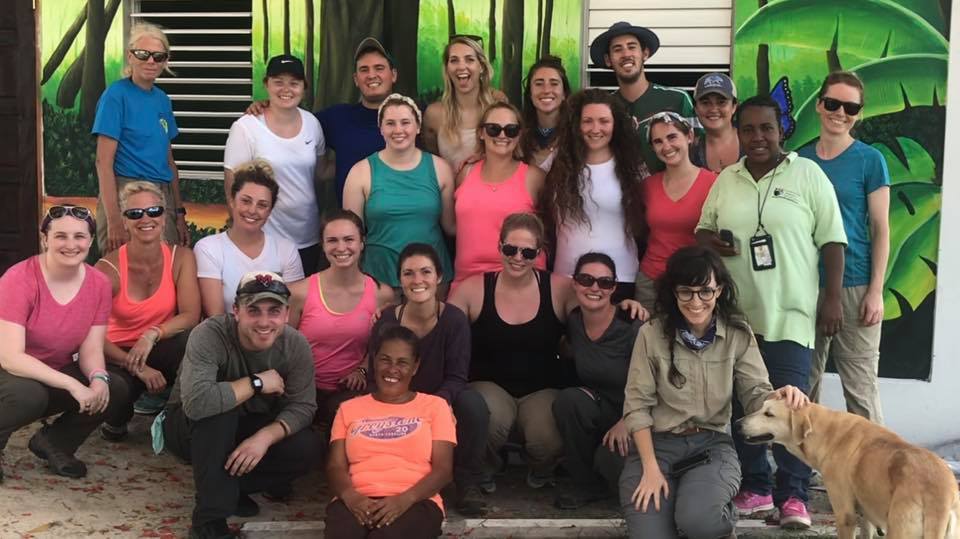With the gray days and cold temperatures in Ohio, it might be exciting to conjure an adventure in a warmer locale. Even better if this adventure comes with graduate school credit.
Sounds like Miami University’s Project Dragonfly, which will accept applications in the fall for its 2020 Earth Expeditions graduate courses that offer experiences in Africa, Asia, Australia and the Americas. The Earth Expeditions can build toward the Global Field Program, a master’s degree that combines such summer field courses worldwide with web learning. Project Dragonfly also offers the Advanced Inquiry Program master’s degree that combines web instruction with field study in the United States. To find out more, we contacted Project Dragonfly participant-turned-instructor Leah Crowe, and recent Project Dragonfly grad Danielle LaChance. First Leah:
Q: Tell us about your background in education and your teaching experiences outside of Project Dragonfly.

A: My career in education came about in a rather unconventional way. I studied Spanish and political science at Wittenberg University in Springfield, Ohio, graduating in 1991. I have always loved to travel and learn about new cultures. Studying abroad in Valencia, Spain, during my senior year at the university sealed the deal.
This wanderlust led me to become a flight attendant for several years. Unfortunately, the airline I worked for went out of business, and I found myself with the opportunity to start something new. A local school needed a substitute to cover a maternity leave, and, although I had never considered teaching, I decided that this might be the adventure I needed. The original teacher didn’t return to the classroom, which provided me the opportunity to return to school to obtain my teaching certificate. I have been teaching ever since.
Fast forward to 2011: I was always interested in science. I loved nature, wildlife, photography and exploration, and I wanted to learn more and protect the things I love. However, as a high school student in the late ’80s, I knew no women personally who worked in the science field, so I followed a different path. I never thought that, at age 42, I would embark on a new adventure that would change my life for the better.
I found Project Dragonfly’s Global Field Program by accident. I had signed up for a newsletter from the Cincinnati Zoo and Botanical Garden, and this program was highlighted. After reading the first sentence, I was sold: “The Global Field Program brings master’s degree candidates, scientists, educators, community leaders, and others together at conservation hotspots in Africa, Asia, Australia and the Americas for firsthand experience with inquiry-driven education, environmental stewardship, and global understanding.”

Here was my opportunity. I began my application immediately. But, I had doubts I could go back to school and work full time. I put the application aside. However, fate had other things in mind for me.
In January 2012, I attended the World Community Conference at the Cincinnati Zoo hosted by Project Dragonfly. At a break-out session I heard the most amazing tale of conservation commitment and education. I remember thinking, “I have finally found the place where I belong.” I went home and finished my application.
Six years later, and I have snorkeled with whale sharks in the Sea of Cortez, explored the jungles of the Amazon, helped traditional landowners restore native habitat in Australia, stood in awe at the beauty of the Great Barrier Reef and explored the amazing natural wonders of Belize.
Through all of this, my most valuable experiences have been with the people. The communities and experts with whom we work across the globe are incredible. Their work and dedication to this planet are beyond inspiring. They give me hope and the courage to make this world better.
In my professional life, I teach high school Spanish by day and Introduction to Biology by night at our local community college. During summer and fall, I facilitate Project Dragonfly’s Earth Expeditions courses as well as work as a Curricular Support Assistant for the program.
I believe 100% in this program and its ability to change the lives of everyone it touches, including mine. I know that I would not be living this incredible life if it were not for taking the leap and embarking on a new adventure of learning and knowledge. What an adventure it has been!
Q: Tell us some specifics about Project Dragonfly.
A: Project Dragonfly has partnered with Miami University of Ohio at Oxford to offer an innovative approach to education with its Global Field Program, Advanced Inquiry Program and Earth Expeditions. Students from all disciplines who are interested in science, conservation, environmental education and/or sustainability and responsible stewardship of the planet are invited to apply.
Project Dragonfly values inquiry, community and voice and uses these ideals as a platform for its master’s programs and Earth Expeditions courses.
As a student in the Global Field Program, I participated in the Baja, Australia and Amazon Earth Expedition courses. In each location, I learned from local experts and worked with local conservationists.
During our field experiences, we learned valuable skills and gained priceless knowledge about the natural world and how local people protect, restore and sustainably manage it. Upon our return, we each completed an Inquiry Action Project. An essential component of these projects was to take what we learned about inquiry, voice and environmental stewardship in the field and bring it home to our communities, whether it involved working with school children, community members, colleagues or other organizations or communities to enact conservation action.
A valuable thing I learned from this program is that the work is never expected to stop. The hope is that our inspiration and dedication to the natural world, its people, wildlife and landscapes continue long after graduation.
During the web-based portion of the program, students take courses such as Biology in the Age of Technology, Professional Media Workshop and Leadership in Science Inquiry. Each program ends with a capstone course where the student’s Master Plan is outlined in detail and goals are set. The quest for a sustainable future never truly ends.
Q: Why do you participate in Project Dragonfly? How has it benefited you as an educator?
A: I participate in this program because it has truly become my passion. I joke that I work my real job so that I can teach Earth Expedition courses in my spare time, for it is where my heart lies.
I remember on my first Earth Expeditions course to Baja, I told my instructor: “Someday, I am going to be you!” I was so impressed that she, like me, did not come from a traditional background, but now was a leader in the field of conservation. As graduation from the program approached, I remember not being able to imagine my life without Project Dragonfly. So, I applied to go on another Earth Expedition and be a Community Learning Leader (and Earth Expeditions instructor, at the same time, just in case one did not work out.)
I was hired shortly after graduation and have been happily facilitating summer and fall courses ever since. (The first person I contacted when I was hired was my instructor from Baja).
I have found a home with this organization, and it has inspired me to bring the passion and enthusiasm I find in the field back home to my classes. I want to be the window to the world for my high school Spanish students. They love to hear stories of my adventures each fall as the school year begins. “Where did you go this year, Señora? What did you see? Did you swim with sharks?”
I find it is easy to integrate the themes of Project Dragonfly into any subject matter that I teach, including Spanish: inquiry, voice, responsible stewardship, appreciation of nature and other cultures, curiosity, wonder and a sincere desire to be an agent of change.
Q: What skills is the program trying to build in participants?
A: Project Dragonfly values inquiry, voice, and community. It is a unique program that brings together scientists, educators, wildlife biologists and others who truly care about the environment and gives them the skills, knowledge and confidence to enact change. It does not matter if you have a traditional science background or if you, like me, truly want to actively get involved in responsible stewardship of this planet and teach others to do so as well.
In the field, we learn from local experts about a variety of topics. For example, in the Australia Earth Expedition, students study marine ecology and conservation, terrestrial environmental conservation, traditional ecological knowledge and sustainable stewardship of the interlaced environments. In addition, we study the amazing biodiversity that exists in this incredible ecosystem.
While each Earth Expedition is unique, they share common themes. Students learn field methods in both terrestrial and marine environments, how to design original research and analyze data, write and publish original work, become community leaders and engage in peer review and conversation. In addition, students develop the knowledge and confidence to share these skills with their communities at home.
During the web-based portion of the program, students take courses such as Biology in the Age of Technology, Professional Media Workshop and Leadership in Science Inquiry.
Throughout the entire master’s programs, students develop and work toward a Master Plan. These overarching projects are self-designed and can be adapted to include the subject matter that each student finds inspiring on a personal level. Students have written curriculum, created community outreach programs, written screenplays, started companies, etc. The diversity of Master Plan topics is remarkable!

Q: What facets of the program would be especially beneficial to STEM educators?
A: Project Dragonfly offers three ways for teachers and other prospective students to pursue their educational interests. For those seeking a master’s degree, they can choose between the Global Field Program and the Advanced Inquiry Program.
The Global Field Program combines web-based coursework with three 10-day field experiences (Earth Expeditions) in conservation hotspots across the globe. The Advanced Inquiry Program combines web-based coursework with onsite learning at one of our partner facilities such as the Cincinnati Zoo and the Cleveland Metroparks Zoo. Students in the Advanced Inquiry Program can also elect to take an Earth Expeditions course as part of their master’s coursework.
For those who do not want to commit to master’s program, Earth Expeditions courses can be taken as stand-alone courses for graduate credit. In addition, students can choose between earning a Master of Arts in Biology or a Master of Arts in Teaching Biological Sciences.
I think this program is ideal for busy, working professionals. The fact that students have the option of selecting the program that best fits their personal schedule and situation makes this educational opportunity unique.
The Global Field Program is especially ideal for teachers because the majority of the coursework occurs online while the Earth Expeditions mostly occur between late May and early August.
The affordability of the program and the opportunity to travel and meet people from all over the world were two factors I considered when deciding to apply. Little did I know, it would become so much more!
Q: Is there anything else you would like to share about Project Dragonfly?
A: I honestly cannot say enough good things about this program and the experiences I have had. The network of amazing conservationists and change-makers that make up our community is second to none.
Participating in the Global Field Program and continuing my relationship with Project Dragonfly long after graduation have changed my life. The opportunities this experience has afforded me are beyond my wildest dreams, and I look forward to what the future has in store.
Sign-up here to get our next posts including an interview with Project Dragonfly grad Danielle LaChance.